"Thought loss anxiety" is the fear of forgetting good ideas due to lack of good record-keeping
hence my obsession with note-making
But first: Who are you cheering for during the Winter Olympics?
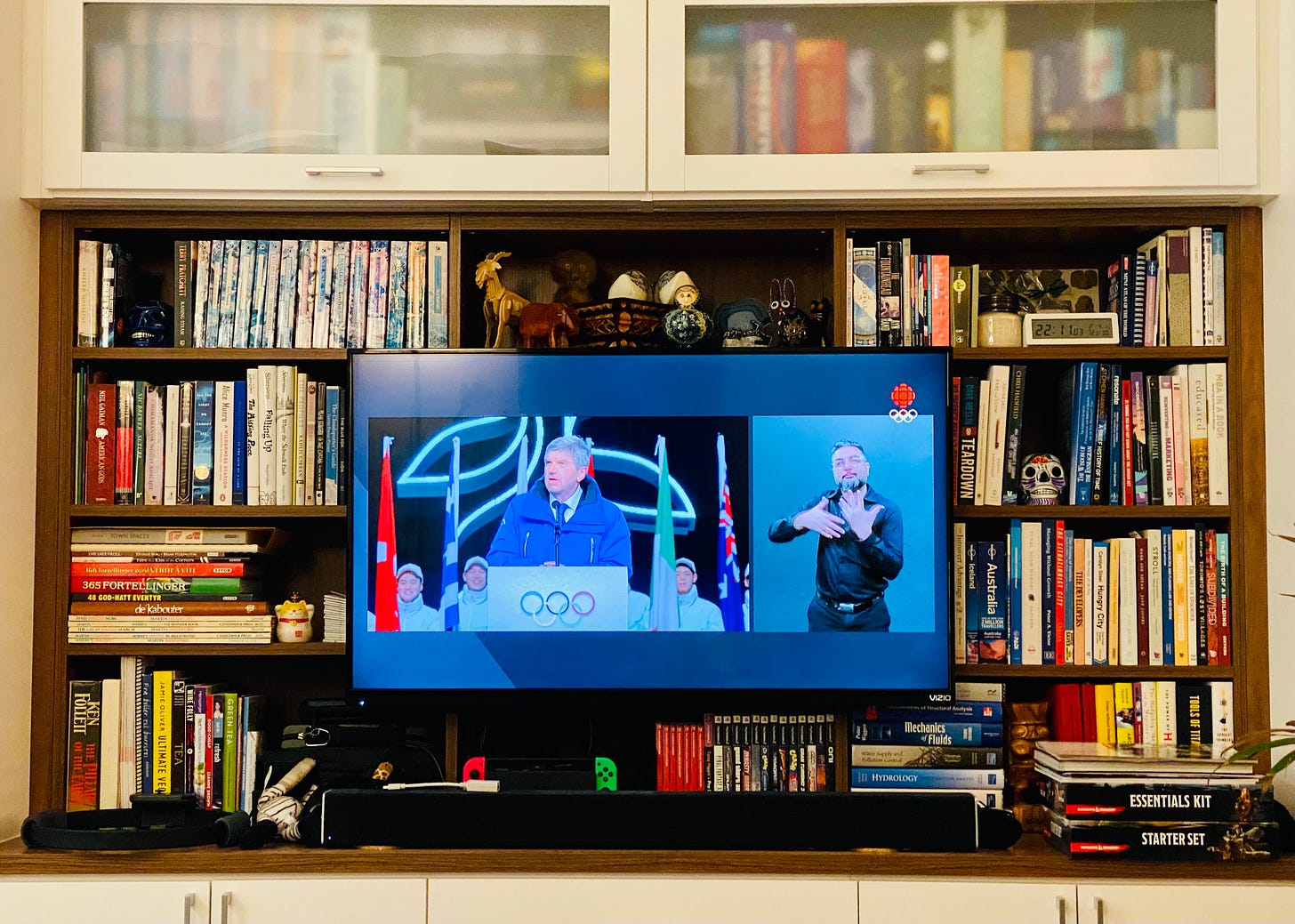
The Winter Olympics are a special event in this household. My fiancé and I get to play up fierce national rivalry between Canada and Norway, a “tradition” that can be traced back to four years ago when we first met, and coincidentally also when the previous Winter Olympics were going on… (It’s a tradition if you do it twice or more times with no plans of stopping, right?)
The Olympics being on is no excuse, but I’ve been slacking a bit on the daily publishing (still got 8 atomic essays to go) and on top of that I’ve been thinking deeply about my note-taking… again.
It’s a topic I come back to again, and again. And again.
It has to do with my mild anxiety around forgetting good ideas.
I overheard Cherry Sun on the RoamFM podcast (Roam is another note-making tool) use the term “thought loss anxiety” and I knew immediately what she meant by it:
If you've had the experience of having too many thoughts flying around at the same time but feeling like they all have value but not being able to consolidate enough of them to have value, you need to use Roam... It removes thought loss anxiety
Things are a bit different now and I’m over a year into building my note-making system in Obsidian. Thoughts don’t get lost that easily anymore. But now I’m focused on how I’m storing them to facilitate for long term insight. Obsidian, just like any blank sheet of paper, can be shaped in many different ways to suit individual neurological needs and characteristics. So what way is the best for me?
I know the grand benefits of just creating a simple system and sticking to it, but this is one activity that I indulge myself the luxury of disruption. If I come across new tools and information about note-taking, I will not hesitate to try them out if they hold any promise for improving what I have.
Even if it means that I start systems from scratch again and again.
Also, you may have noticed that I used the word “note-making” instead of the traditional term “note-taking”. It’s more of a mental distinction for me, to remind myself that what I’m doing is not just passively transcribing information that I receive onto the page: I’m processing ideas and making something out of it. We can do a number of things with ideas on paper:
increase its contrast and definition to find the boundaries of the idea
add our own perspective to enrich it and make it our own
ask how this idea answers a question that we’re seeking answers on
associate and attach this idea to one or more ideas we’ve had in the past
Similar to real thoughts, the more touch-points an idea can make with other ideas on the page, the greater the surface area for potential sparks of insight becomes. This is why writing is such a good tool for thinking, because it is the closest thing we humans have to a technology that can assist the brain and increase its capabilities for generating insight.
It is why writing is often cited as a “tool for thought”.
If you read the second mini-essay (Day 20) below, you’ll learn that I recently tried a note-making tool called Logseq and was kinda blown away by it. Since then, I’ve been working on incorporating it into my note-making system which, as you know, already uses Obsidian. There were a lot of wrinkles to iron out between the two, but I finally got to a good place this morning…
Hence the lack of Ship30 essays 😅
Ship30 updates
At this rate I might have two more weeks to go to finish the Ship30 challenge, but I’m happy to take my time and make my way through on my own pace 🏕🏞
Day 19: How to see the world through a life-making/thing-making lens
I'm really fascinated by how the concept of life-making vs thing-making has put the world in sharp relief for me.I'm now able to categorize stuff into the two buckets, and figure out why some things struggle so much more than others.
First of all, thing-making can also be read as "profit-making". They are the same, but the latter sounds more crass.
Second of all, there are actually three buckets:
Bucket 1: Thing-making i.e. making for the sake of profit
Thing-making is usually a transactional/conditional activity. You do it expecting something in return.
Chasing growth for the sake of growth (company share values, chasing more user adoption of a product)
Taking "free" things and repackaging it to sell it again (bottled water, bio-engineered seeds, your onine data)
Solving problems with the same thinking that caused it in the first place (EV cars, algorithmic moderation of online social media)
Optimization by removing humans from the equation (machine-made replication of original human work)
Bucket 2: Life-making i.e. making for the sake of life-enrichment
Life-making is usually an unconditional activity. You do it for the sake of doing it.
making and fixing things yourself (DIY)
growing more than you can eat (so you end up sharing)
throwing neighbourhood block parties (meeting new people)
decorating a space (creating comfort)
collecting and building Lego sets (satisfying an obsession)
raising a family (the ultimate life-making)
Bucket 3: Activities that straddle life-making and thing-making
Some life-making activities attempt to cross the line and become thing-making activities. However, for whatever reason, they often struggle to be fairly compensated within a thing-making world. My theory is that the more an activity is purely defined as life-making, the harder it is to convert to an equivalent thing-making value that both sides of the transaction are satisfied with.
Restaurants and hospitality (one of the original life-making activities that crossed the chasm towards thing-making)
Healthcare (one of the most basic forms of life-making that struggles with proper distribution to those who need it the most, and with proper pay of less professionalized providers)
Arts and culture (the creation of art and culture are both deeply life-making activities, and is often undersold in a thing-making world)
Design (creating good designs is an act of life-making, but often the pay is not commensurate with the thing-making value that it generates)
Retail/Grocers (food is a life-making thing being sold in a thing-making enterprise)
My takeaway from this is that thing-making activities can easily be made consistent across situations, and can be quantified by how much time or money. But life-making activities are rarely comparable. For example, the work of one artist can be vastly different in valuation than the work of another artist, even though they put in the same amount of time, money, and effort. There can be huge disagreement in compensation due to differing opinions on the "value" of the end result.
I have no answers. All I know is that this is a current dilemma between thing-making and life-making activities, and that life-making activities ought to be less punished for how incompatible they are in our thing-making dominated world.

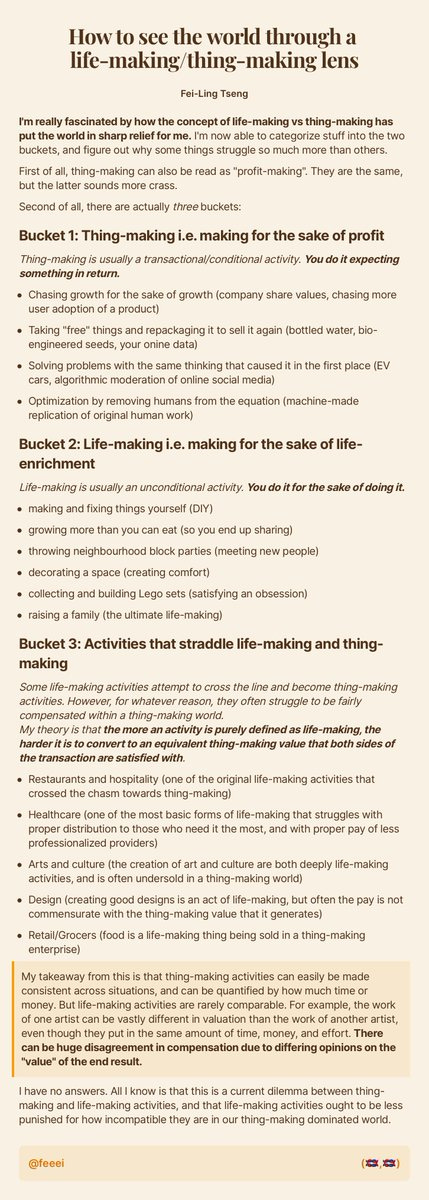
Day 20: What 30 mins with Logseq did to me.
Backstory
Today I binge-listened to a podcast called RoamFM, where they bring in guests who are considered stars in the Roam and TfT community.
While my notes are on Obsidian for various reasons, Roam is a note-taking app that I've been following closely.
Listening to the podcast, there was something about the zealousness of Roamans (this is what they call themselves) that moved me. There was something about how they described their relationship with their notes which got me swept up in their excitement, but what I noticed more acutely was the absence of this kind of euphoria when I thought about my notes in Obsidian. I mean, I love writing in Obsidian, but this excitement being communicated through the podcast was next level.
After listening to 5 hours of Roam content, I was primed. I decided to finally try Roam Logseq.
Wait, what? Ok, yes... Logseq is very similar to Roam, but it uses locally hosted markdown files (fancy text files) instead, just like Obsidian, so you always own all your data in a simple, future-proof format.
My first 30 minutes with Logseq
Here's one of the first things I ever wrote in Logseq:
Man, just using Logseq (tool) for 5 mins and I can already feel that there's a material difference between typing here and in Obsidian. What is this sensation? All I can see in terms of difference is the way that every paragraph (hard enter) is treated like a new bullet, or block as they call it here. And I'm here, typing in the journal page. What's up with that?
Further down in a sub-bullet to the above note (I decided to delve into this mystery a bit) I wrote:
Realization: I'm literally having a conversation with myself here in a way that I've never felt compelled to in Obsidian. It's an inquiring and inquisitive part of me that is invited to write in these blocks about my stream of consciousness. Very interesting.
For the next 30 minutes, I just sat and wrote to myself about the differences between Obsidian and Logseq, trying to come up with a theory on why I felt so different in Logseq, even though the experiences are very similar on the surface.
This was a high quality activity of inquisition. I've never thought and written so thoroughly on a single point of curiosity before.
How did this tool enable this inquiry within me? I'm still investigating.

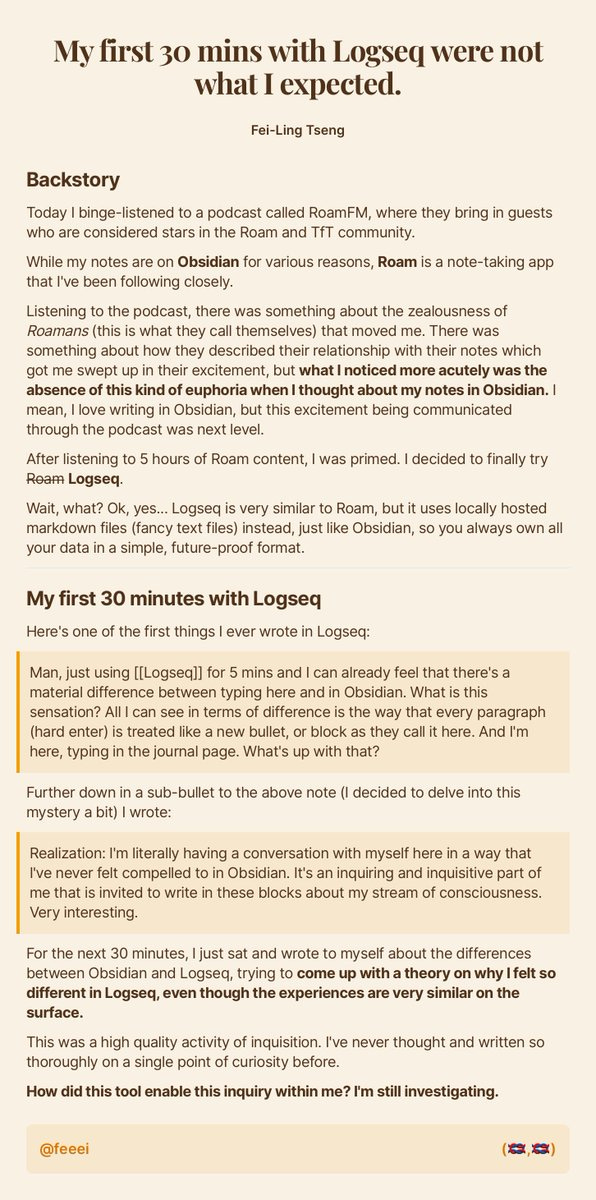

Day 21: Writing is a scaffold you make to access your personal genius, and modern note-making apps make this more accessible than ever.
Fostering a mind of genius was previously reserved for the few who were able to do it all in their heads, or with very few means.
Geniuses were sparse, and special. Gifted, one would say.
Some were fortunate and could tap into their geniuses by writing with pen and paper. But most of the time, the rest of us may have sensed extra potential in ourselves but had no idea how to tap into it, even with pen and paper at hand.
It is a dark time to be stuck with your own thoughts, wanting to somehow build on them in a constructive way, but unable to think of a good way to do it.
Recently, with the advent of the internet, a new type of work is emerging: "knowledge work", or insight-driven work. In lineage I see it related to Richard Florida's Creative Class, which was in many ways the v1 definition for this new type of work.
Along with knowledge work and PKM, a new wave of note-making apps are helping open doors in our minds, and it is exhilarating.
These apps are being born out of several new needs we have as a collective:
to make sense of the information-saturated, noisy environment that we now exist in,
the increasingly complex problems that we face as a species, and
the alienation we are experiencing as individuals,
all of which can feel like the world spiralling out of control.
Many reading this are already sold on the benefits of these apps, and how it improves our writing and thinking.While we may be naturally autodidactic, many will have a timeline consisting of the "Before Times" (as Maggie Appleton puts it) where ideas and insights got fumbled and lost, and a clear break afforded by these note-making apps that provided the scaffolding needed to help prop our ideas and thinking up.
However, we are the before-crack-of-dawn-early adopters. And we're entering a new phase where the gravity of the community growth is causing us to become collectively self-conscious. We're now quibbling amongst us about good terms and metaphors to properly describe this upswell of knowledge work, tools and methods, and things are getting heated.
While finding the right words and metaphors for our work is important, I would rather embrace the beautiful heterogenous nature of this space.
I believe it would be a loss to the community if we all gravitated towards one or a few terms for this. It would mean that we're all neurologically similar. How boring!
Instead of asking "are you (this kind of) intelligent?", we should be asking "what kind of intelligent are you?"
Call it a Second Brain, or a BrainForest, or a ThoughtMine, or whatever you want. Who cares. Make it work for you.
One of the strengths of our community is to make welcome whoever wants to pursue knowledge work. Let's stay inclusive by fostering this highly emergent space to continue generating a myriad of different size and style of names, methods and tools to suit any neurological disposition.
Finally, let's celebrate this era we're in which allows more to nurture their personal genii.
The future gets brighter with every individual's tinderbox of thought we can spark.
Day 22: If you're dissatisfied with your writing, do this to get out of your funk.
This is the advice I wish I had heard when I first started writing. in earnest 6 months ago.
Being confused, frustrated, and dissatisfied with your writing, especially in the beginning, is normal. You're just trying to find yourself and your voice... (seriously, no big deal)
Your dissatisfaction means that you know something's not quite right, and you don't know where you want to go with this, or how. The fact that you're out here trying means that you want to gain traction to go somewhere.
As a disoriented, but eager writer, this is a tough spot to be in. you're flying blind, with no gravity or landmarks to guide you.
If you're at this stage, the most important thing is to conduct self-mapping through writing. You're using your writing as an interface to learn about yourself and potential fruitful directions to pursue.
How to write for self-mapping
Pretend you don't know who you are, what you like, or are good at. leave behind any assumptions or guesses about the terrain that is you. you're just information gathering.
Now, try as best as you can to implement a writing habit that exhibits the following traits:
try very small pieces. be pithy.
try different subjects, voices and angles.
try publishing consistently. daily is best.
Here's the thing: when you do something a lot of times, you can't help but start developing intuition about it.with every rep, you're collecting a piece of evidence that can be corroborated to a pattern about you and your writing.
Pay attention to markers like:
the pieces you are the most proud of
the pieces that were the fastest/slowest to write
the pieces that resonated the least/most with people. is there a pattern between your most successful pieces?
Do reps until you've collected enough evidence that allows your gut to intuitively follow the markers you've found along the way to plot a route forward. (I seem to like writing about X, or X subject seems to resonate well with me/my audience)
IMPORTANT: Resist forced direction, i.e. wishful, projected thinking. look to the evidence to guide your intuition forward.
The idea is to map the territory between you and your writing. It's a complex relationship, so you will need to collect many data-points to glean patterns from it. How many data-points, you say? Well, how many instances of a phenomenon do you need for your gut to be convinced that there's something worth looking into here? That many. For me, the minimum was around half a dozen.
Write to dial in what you gravitate towards, and tune your compass to follow that.
Trust the process and I promise, you will find your way.

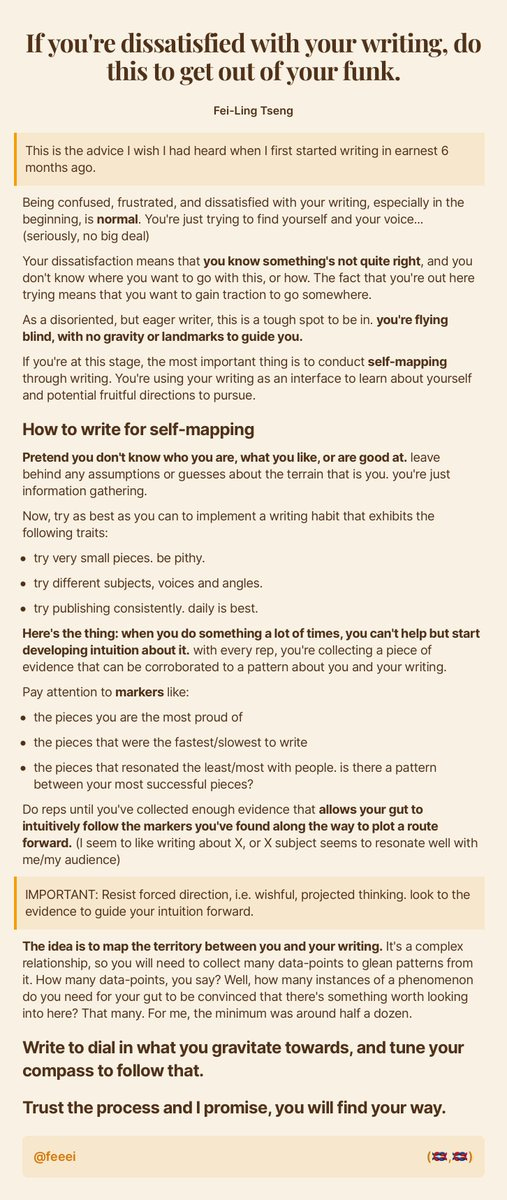
All of these atomic essays were fun to write, though some took way longer than others. I find that when I care a lot about the idea and have a vested interest in communicating it well, it takes x2-5 longer. Not only is the expression more strained, I also find myself in a more critical frame of mind.
Do you find the same in writing, or otherwise? I’d be curious to know.
Give this letter a ❤️ if you enjoyed it!
And as always, stay safe and stay curious.
—Fei🪢



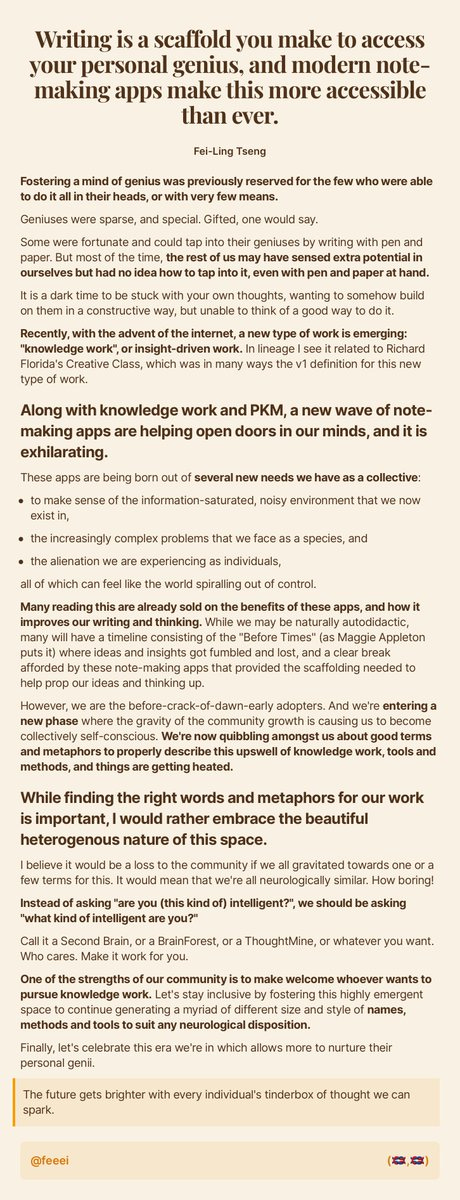
Thing making and life making!this really got me thinking because I was boggling my own mind with the difference between a creator vs artist. Creator in the sense of making money creating content. Where as artists seem to be more life making? Not necessarily looking to create what people want, but rather share a point of view that, more likely than not, is not popular. Hmm I don’t have any answers either but really enjoyed your take on this!